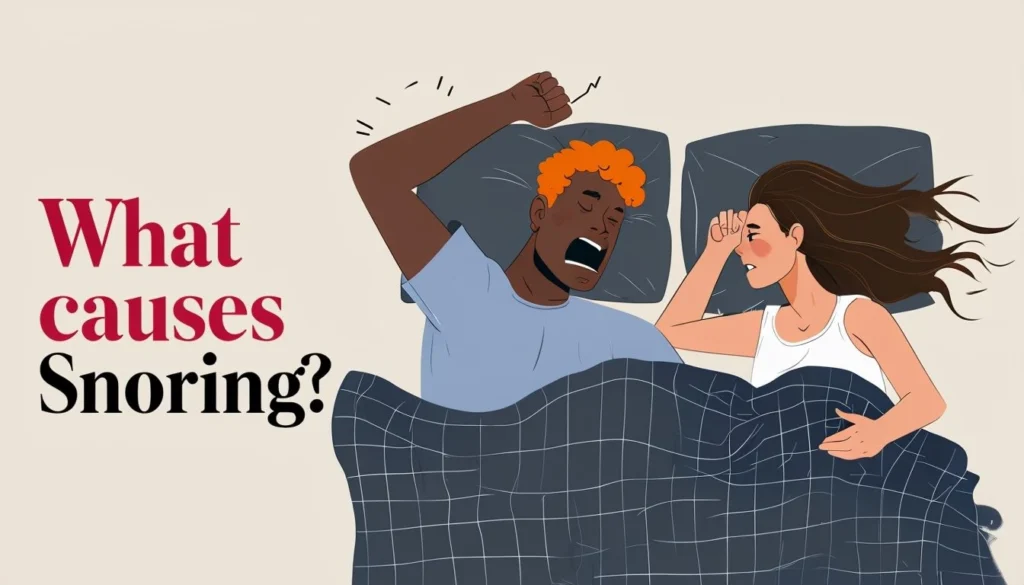
Introduction: Understanding Snoring and Its Impact
Snoring is more than just a nighttime annoyance—it affects 40% of adult men and 24% of adult women globally, according to studies. While it might seem harmless, snoring can disrupt sleep, strain relationships, and indicate underlying health issues. This comprehensive guide dives into the causes, risks, and remedies to help you and your loved ones achieve better sleep.
What Causes Snoring?
Anatomical and Physiological Factors
Snoring results from airflow obstruction, causing throat tissues to vibrate. Key factors include:
- Nasal Congestion: Allergies, colds, or sinus infections narrow nasal passages.
- Obstructed Airways: Enlarged tonsils, a deviated septum, or nasal polyps block airflow.
- Relaxed Throat Muscles: Age, alcohol, or sedatives can cause muscles to collapse.
Lifestyle Factors
Your habits play a significant role:
- Sleeping Position: Lying on your back lets the tongue fall back, blocking airflow.
- Excess Weight: Neck fat compresses airways, worsening snoring.
- Alcohol and Smoking: These relax or irritate throat tissues, increasing snoring frequency.
Medical Conditions
Chronic or severe conditions may also contribute:
- Obstructive Sleep Apnea (OSA): Repeated breathing pauses during sleep.
- Hormonal Changes: Pregnancy and menopause often bring temporary snoring.
- Chronic Sinusitis: Persistent congestion restricts airflow.
Why Snoring Matters: Hidden Health Risks
Snoring isn’t always harmless. It can:
- Increase the risk of cardiovascular issues, including hypertension.
- Lead to daytime fatigue due to poor-quality sleep.
- Create strain in relationships due to disturbed sleep for partners.
How to Stop Snoring Naturally
Explore these easy and affordable remedies:
- Change Your Sleep Position
- Sleep on your side to prevent airway blockage.
- Lose Weight
- Shedding excess neck fat reduces snoring severity.
- Avoid Alcohol Before Bed
- Alcohol relaxes throat muscles, worsening snoring.
- Stay Hydrated
- Drink water throughout the day to prevent thickened mucus.
- Use Nasal Strips or Dilators
- Keep nasal passages open during sleep.
- Practice Good Sleep Hygiene
- Establish a regular sleep schedule and declutter your sleeping environment.
Medical Treatments for Persistent Snoring
If natural remedies don’t work, consult a healthcare provider. Options include:
- Continuous Positive Airway Pressure (CPAP)
A machine keeps airways open. - Oral Appliances
These reposition the jaw to reduce snoring. - Surgical Solutions
For severe cases, surgeries like UPPP or laser-assisted procedures remove excess tissue.
Tips to Maintain a Snore-Free Lifestyle
- Exercise Regularly: Build muscle tone to prevent airway collapse.
- Elevate Your Head: Use an adjustable bed or extra pillows.
- Avoid Sedatives: Discuss alternatives with your doctor.
- Humidify Your Room: Dry air irritates nasal tissues.
FAQs About Snoring
What is the best sleeping aid for snoring?
Nasal strips, anti-snoring pillows, or CPAP machines can be effective.
Can snoring be permanently cured?
It depends on the cause. Lifestyle changes and treatments can minimize snoring, but chronic cases may require medical intervention.
When should I see a doctor?
Consult a professional if you experience daytime fatigue, choking during sleep, or pauses in breathing.
Conclusion: A Restful Night Awaits
Snoring can disrupt more than sleep—it affects health and relationships. By understanding its causes and adopting the right remedies, you can take control and enjoy peaceful nights. Start with simple lifestyle changes and explore medical options if needed.















